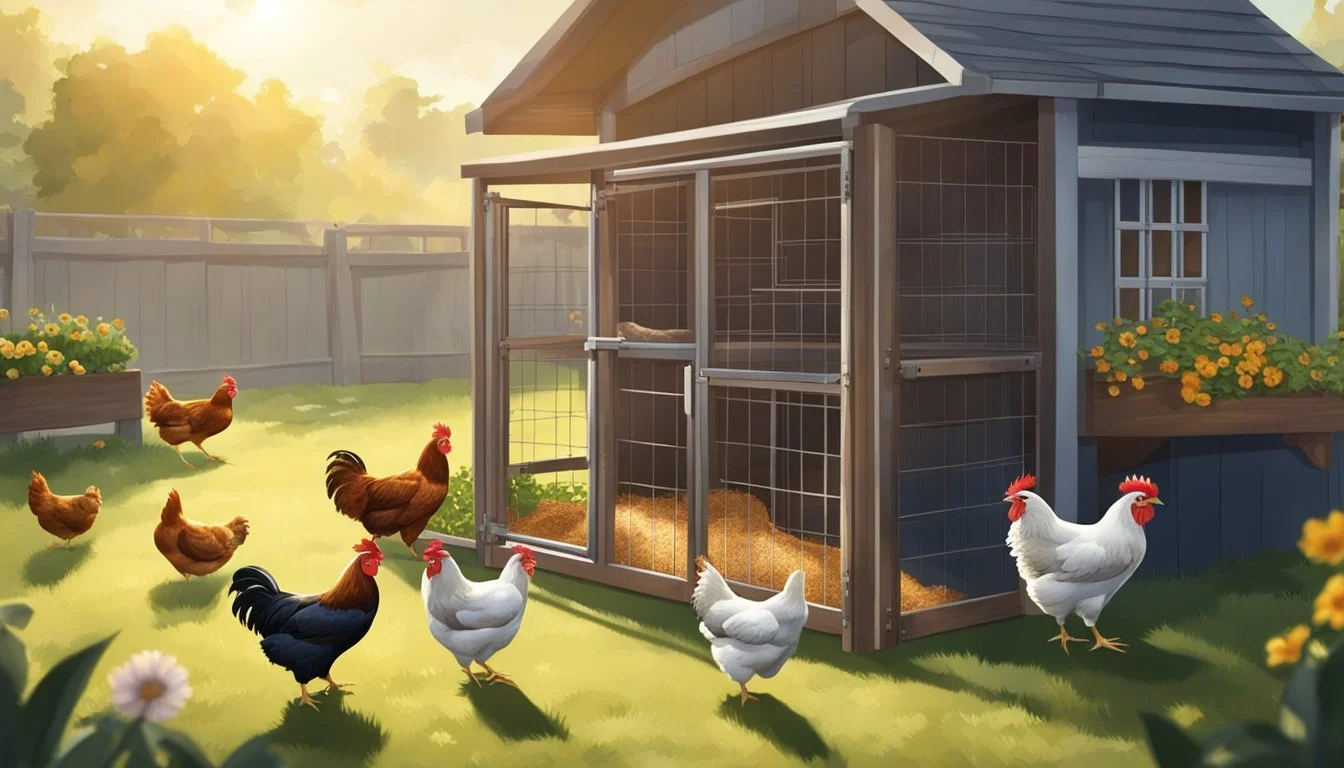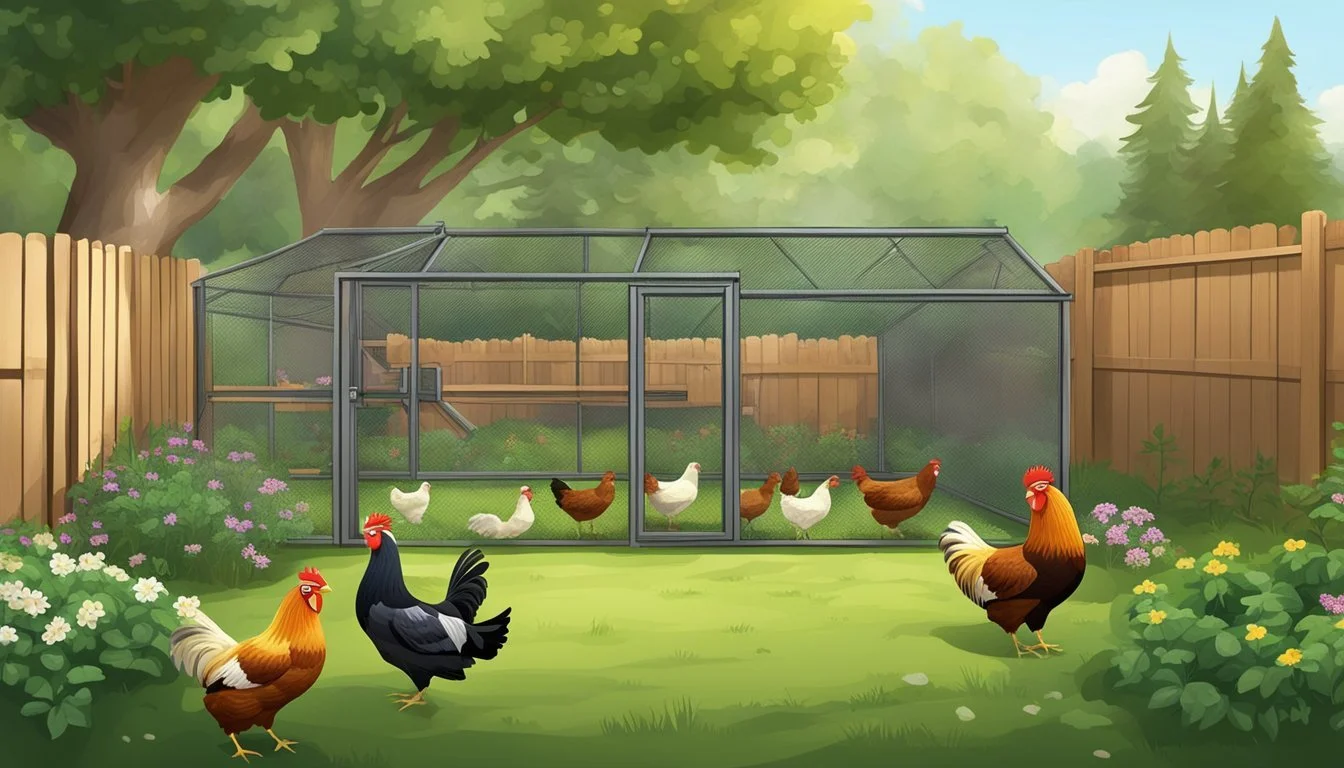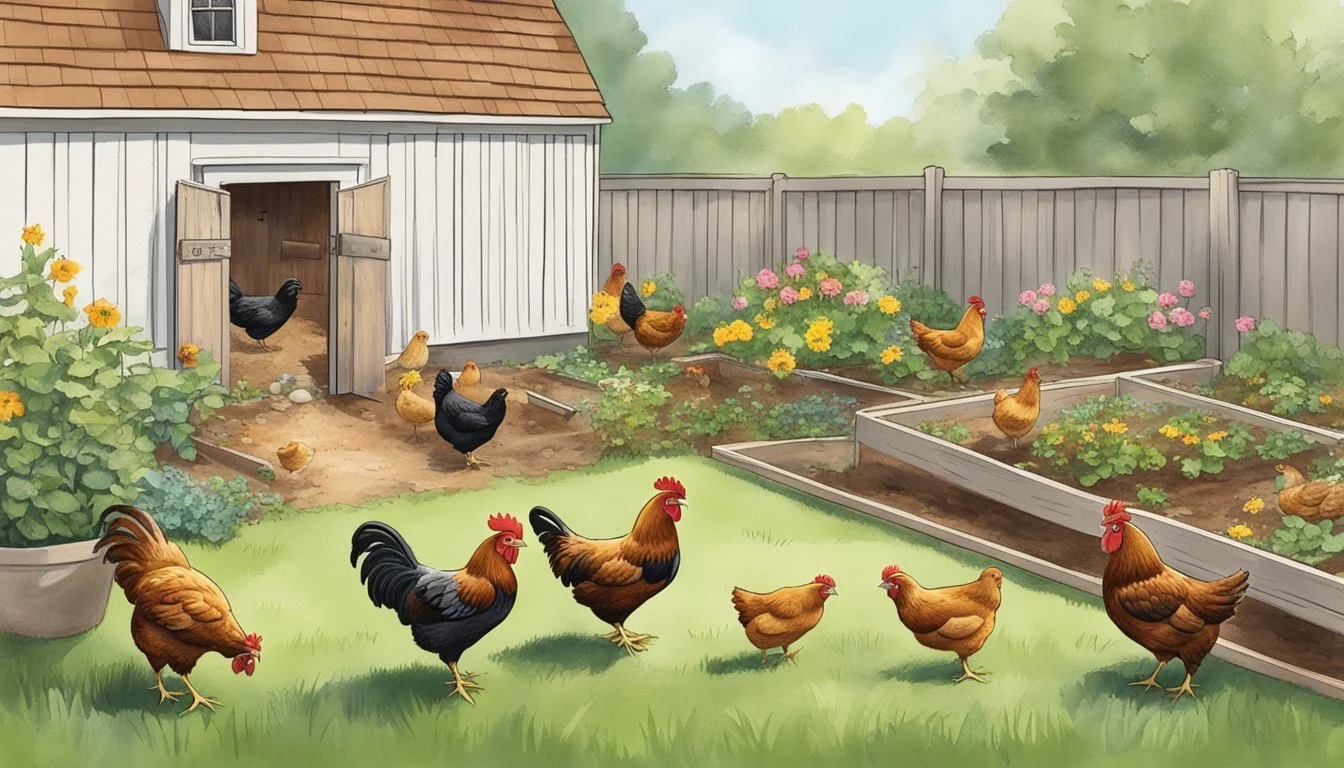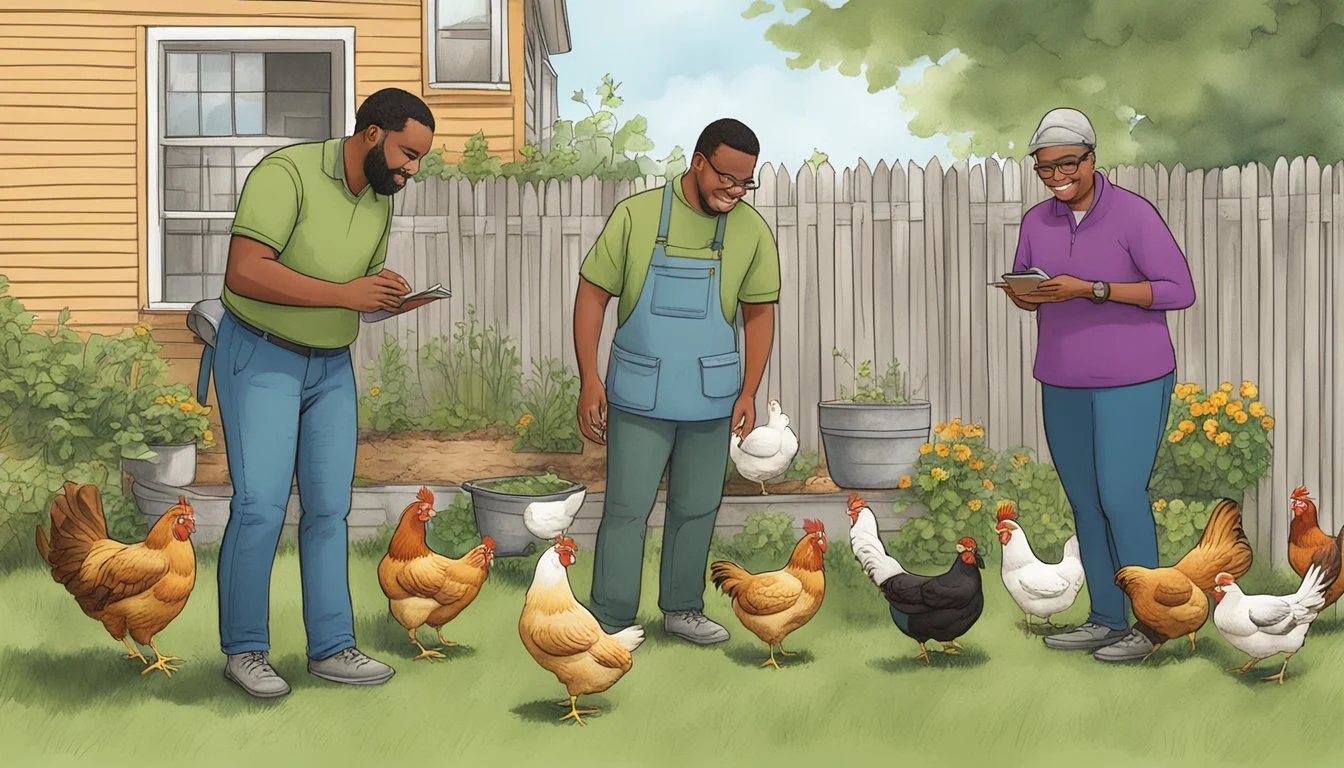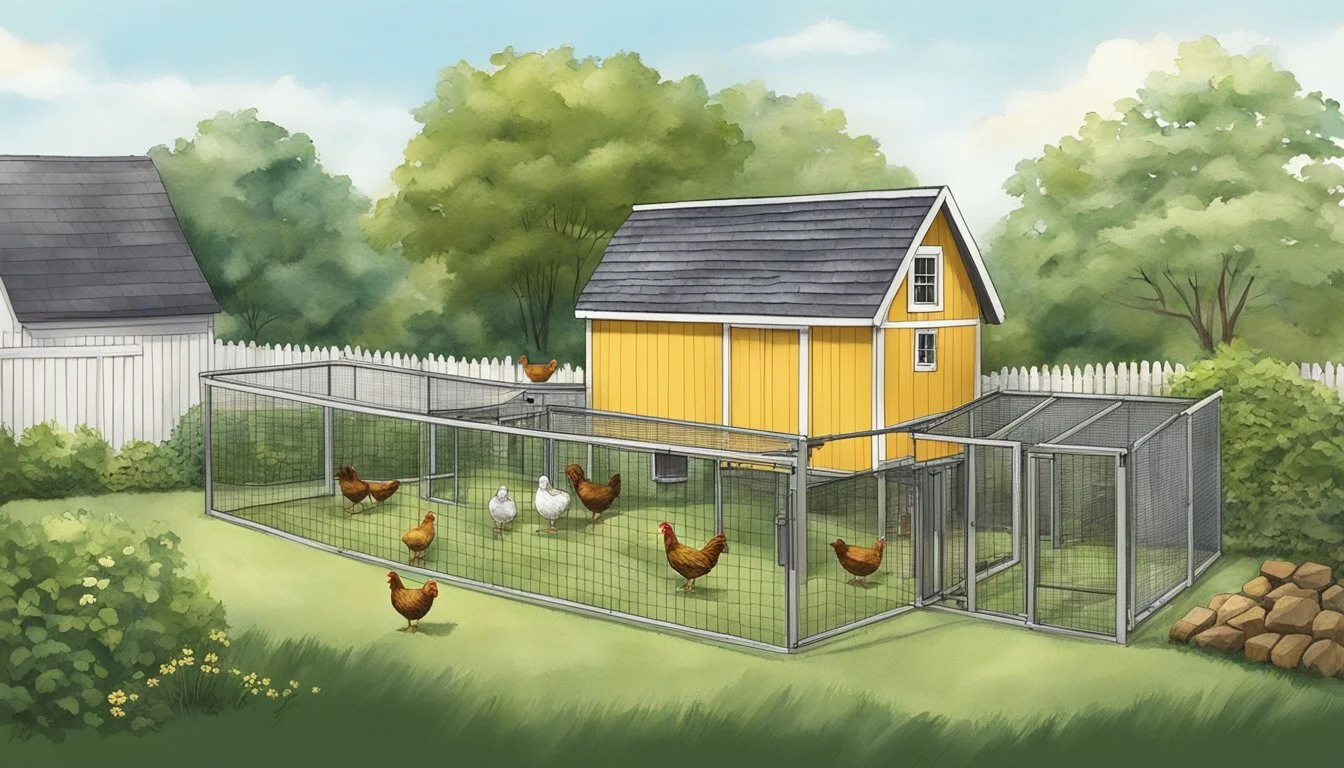Keeping Backyard Chickens in Providence, RI
A Practical Guide
In Providence, Rhode Island, the urban homesteading movement has taken a particular interest in the practice of raising backyard chickens. As residents seek greater sustainability and independence in food sources, the presence of chickens in backyards has become more commonplace. This endeavour provides families with fresh eggs and the opportunity to educate themselves and their children about animal care and food origins.
The city of Providence has established specific ordinances to ensure that the keeping of chickens is consistent with community standards and health regulations. Residents are permitted to keep a maximum number of hens—roosters excluded—to minimize noise, and the structures housing the chickens must adhere to guidelines promoting secure and sanitary conditions.
Adherence to local laws regarding the feeding, housing, and slaughter of chickens is paramount for Providence residents interested in this practice. The city focuses on preventing nuisances and maintaining public health standards while allowing individuals the joy and benefits of raising their own chickens within a metropolitan setting.
Basics of Keeping Chickens in Providence
In Providence, Rhode Island, residents can enjoy fresh eggs and companionship from backyard chickens, provided they adhere to specific local regulations. It’s important for potential chicken owners to understand these before starting their flock.
Understanding Local Regulations
The City of Providence permits the keeping of chickens under certain conditions. Residents are allowed to have one chicken per 800 square feet of lot area with a maximum of six hens; however, roosters are not permitted due to noise concerns. Further, all hens must be housed in a coop with a fenced outdoor area. Adequate space, cleanliness, and adherence to local health and safety standards are imperative.
Benefits of Raising Backyard Chickens
Raising backyard chickens offers a multitude of benefits. Not only do chickens provide a steady supply of fresh eggs, but they also contribute to pest control and can create rich compost for gardens. They can be a source of entertainment and education for families.
Choosing the Right Chicken Breed
Selecting the appropriate chicken breed is crucial for a successful backyard flock. Some breeds are better suited to the climate and urban environment of Providence than others. Prospective chicken owners should consider factors such as temperament, egg production, and cold tolerance when choosing their breeds. Popular breeds for urban settings often include the Rhode Island Red and Plymouth Rock, both known for their adaptability and friendly nature.
Housing and Coop Requirements
Providence, Rhode Island, mandates specific conditions when it comes to backyard chicken coops to ensure the well-being of the chickens and harmony within the community.
Coop Design and Size Specifications
Chicken coops in Providence must provide a minimum of 2 square feet per chicken. This is crucial for the comfort and health of the birds. The overall coop design should ensure that chickens are sheltered and protected while also allowing enough space to move freely.
Ventilation and Predatory Protections
A chicken coop must be properly ventilated to maintain good air quality and to keep the coop dry, but it should also be designed to protect against predators. The coop must have a covered hen house to shield chickens from aerial and land-based predators.
Maintaining a Clean and Dry Coop
The coop should be situated on a permeable surface to prevent waste run-off and to maintain a dry environment. Regular cleaning is mandated to keep the coop sanitary at all times, significantly reducing the chances of disease and odor that could impact both the chickens and the surrounding neighborhood.
Legal and Zoning Considerations
When keeping backyard chickens in Providence, RI, residents must navigate a series of legal stipulations and zoning requirements. These rules are designed to ensure public health, animal welfare, and neighborhood harmony.
Understanding Zoning Ordinances
Zoning ordinances in Providence, RI dictate where and how residents can keep chickens. The zoning ordinance defines the types of structures permitted for housing chickens and the specific placement of these structures on a property. It’s crucial to consult the local zoning maps and guidelines to determine if one’s property falls within an area where keeping chickens is allowable.
Max Chickens Allowed and Rooster Restrictions
The number of chickens allowed is typically governed by the size of one's property. For instance, Providence city regulations may stipulate:
Max Chickens Allowed: A certain number per square footage of yard space.
Roosters: Often restricted due to noise concerns.
Failure to comply with these limitations can result in fines or removal of the chickens.
Permits and Municipal Regulations
Residents may be required to obtain permits before setting up a backyard coop. Municipal regulations often demand that coops meet certain construction standards:
Permits: Proof of compliance with local laws may be needed.
Municipal Regulations: Enclosures must be kept clean, and chickens must be provided with adequate space (2 square feet per chicken as a common standard).
By following these guidelines, Providence residents can enjoy keeping backyard chickens while respecting the legal parameters set by their city.
Health and Well-being of Chickens
Maintaining the health and well-being of chickens involves a strategic approach to their diet, preventative measures against diseases, and managing hygiene and waste. It is crucial for keepers to address these aspects to ensure the flock's optimal health and productivity.
Feeding and Nutrition
Chickens require a balanced diet to thrive, consisting of proteins, carbohydrates, vitamins, and minerals. Owners should provide a nutritionally complete poultry feed as the core of their diet. Access to clean water at all times is equally important. Additionally, they can be offered kitchen scraps and garden produce in moderation.
Disease Prevention and Veterinary Care
Regular veterinary check-ups are vital in detecting early signs of illness. Vaccinations and biosecurity measures, like minimizing contact with wild birds, can prevent avian diseases such as Avian Influenza. Ensuring chickens are free from stress by providing ample space and a comfortable environment also bolsters their immune system.
Hygiene and Manure Management
Cleanliness in the coop is crucial to prevent the proliferation of pests and diseases. Coops should be designed for easy cleaning and proper ventilation. Regular removal and proper disposal of manure minimizes odor and discourages pests like rodents and flies. Manure can be composted and used as a fertilizer, turning waste into a resource.
Daily Routines and Chicken Care
Maintaining a healthy and productive backyard chicken environment in Providence, RI, involves developing daily routines centered around egg collection and coop maintenance. Proper care ensures the well-being of the chickens and the quality of the eggs they produce.
Egg Collection and Handling
Egg collection should be a daily task, optimally completed in the morning to reduce the risk of eggs getting soiled or damaged. A gentle approach is crucial when collecting eggs to avoid causing stress to the hens.
Use a basket or container with a soft lining to prevent cracking.
Visually inspect each egg for cleanliness and integrity.
Store eggs at a consistent temperature to maintain freshness.
Regular Cleaning and Maintenance
Regular cleaning is essential not only to the health of the chickens but also to prevent odors and deter pests. A clean coop minimizes the risk of disease and ensures a secure environment.
Remove and replace bedding materials weekly or as needed to keep the coop dry.
Disinfect waterers and feeders to prevent the spread of disease.
Secure the coop against predators, ensuring that all latches and barriers are intact.
One’s responsibilities as a chicken owner include ensuring that the birds have a safe living space and that their daily needs for food, water, and cleanliness are consistently met.
Navigating Community Relationships
Raising backyard chickens in Providence, RI involves being mindful of community dynamics. It's important for chicken owners to manage their flocks in a way that minimizes disturbances to their neighbors.
Dealing with Noise and Nuisance Complaints
Noise is often the primary concern with backyard chickens. Hens typically make noise during the day, especially after laying eggs, and while this is usually less disruptive than the crowing of roosters (which are prohibited in Providence), it can still lead to nuisance complaints. Here are specific steps to address potential issues:
Sound-proofing Coops: Owners can mitigate noise by ensuring their coops are well-insulated and as far from property lines as permissible by local regulations.
Open Communication: Engage with neighbors proactively, informing them about the chickens and discussing any concerns they might have.
Promoting Good Neighbor Practices
Owners of backyard chickens can foster positive relationships through good stewardship and considerate practices:
Cleanliness:
Regular Cleaning: Maintain the coop and surrounding area to prevent odors and pests.
Secure Feed Storage: Store chicken feed in sealed containers to avoid attracting rodents or other wildlife.
Visibility:
Aesthetic Coop Design: Build or select a coop that is visually pleasing and complements the neighborhood's aesthetic.
Landscaping: Use vegetation or privacy screens to gracefully integrate the coop and chickens into the yard without them being an eyesore.
Education:
Share the benefits of raising chickens, like sustainable living and fresh eggs, to increase understanding and appreciation among the community.
By demonstrating responsibility and consideration, chicken owners can greatly reduce the chances of disputes and enhance community relationships.
Resources and Additional Information
Residents interested in keeping backyard chickens in Providence, RI, have access to a variety of resources to ensure they are in compliance with local laws and educated on best practices. Below is pertinent contact information for local city council and educational opportunities for current and prospective chicken owners.
City Council and Local Municipalities Contact
For detailed ordinance information and regulations pertaining to the keeping of backyard chickens, individuals should reach out directly to their local city council or municipality. In Providence, the contact details for the city council office are as follows:
City Council Office:
Address: 25 Dorrance Street Room 310, Providence, RI 02903-3215
Phone: (401) 521-7477
Residents may inquire about specifics within Article I of the Code of Ordinances related to the keeping of chickens and can also request any additional guidelines that their municipality has in place. It is recommended to review local zoning codes and nuisance provisions, as they may vary by area.
Educational Resources and Workshops
Knowledge is key when it comes to successfully raising chickens. Locals can benefit from workshops and educational resources designed to teach effective chicken care, coop construction, and overall best practices.
Educational Institutions: Various local organizations and agricultural extension offices may offer classes and workshops. Online Forums: Sites like BackYard Chickens provide a platform for individuals to learn and share information.
By staying informed and connected with the community, would-be chicken owners can deepen their understanding of responsible and legal backyard chicken-keeping.

